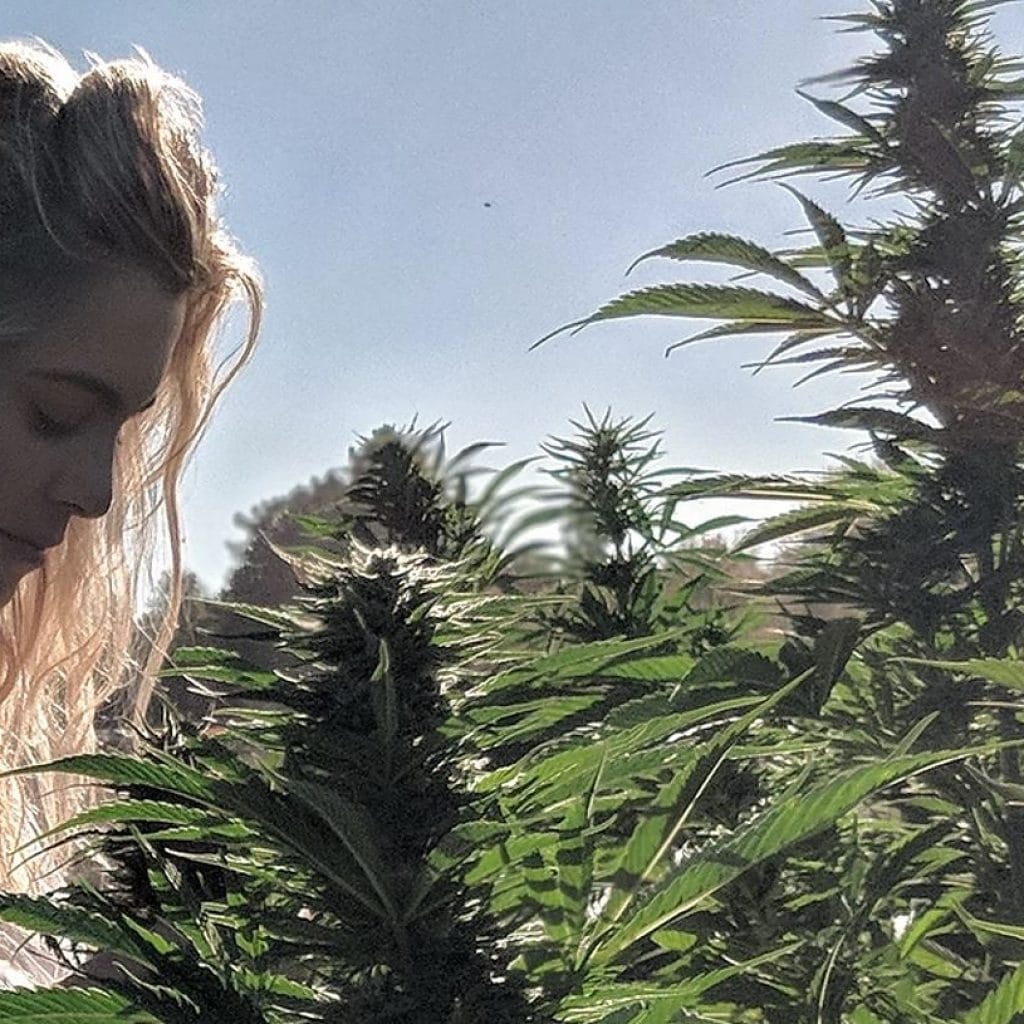Cannabis documentary about epilepsy to foster more understanding
There is nothing Chelsea Leyland (30) would like more than for her older sister to have access to medicinal cannabis too to curb the daily epileptic seizures. But…her sister lives in the UK and medicinal cannabis is not permitted in that country. Leyland, an epilepsy patient herself, is currently working on a documentary about her own life and that of her sister, who has sustained irreparable brain damage as a result of the many seizures. The documentary Separating The Strains is aimed at providing more insight into the effects of medicinal cannabis and at fostering understanding and empathy amongst doctors and politicians in the UK.

The fascinating life of Chelsea Leyland
The film, which is set to be released at the end of this year, will show a world of contradictions. Chelsea Leyland is a young successful DJ and model, lives in New York and travels around the world to attend the best parties. Her fascinating life is in stark contrast with that of her older sister Tamsin (35), who lives permanently in a full time care because of her illness.
Chelsea Leyland has access to medicinal cannabis, her sister does not. At the moment British-born Leyland lives in America, where medicinal cannabis has been legalised in 29 States. “People ask me why I don’t take my sister to New York, but she is too ill to fly. She has 20 to 30 seizures a day and needs 24/7 care.”
According to figures from the British epilepsy association, more than half a million Brits suffer from epilepsy. Since her early teens, Leyland has had a type known as juvenile myoclonic epilepsy. Two years ago, she stopped her regular medication and gradually moved over to CBD oil. Leyland had serious sleeping issues that were caused by her epilepsy medication. A nasty side effect, because a lack of sleep only increased the frequency of the epileptic seizures.
It was never Leyland’s intention to stop her epilepsy medication. She went to her neurologist for advice. He was very dismissive about her wish to learn more about medicinal cannabis. “I was so angry with my doctor. I felt totally unsupported. I expected supervision and involvement, but what I got was a narrow-minded response. The trust and confidence in my doctor was gone, and I decided to find out for myself.”
CBD oil
Over time, the popularity of CBD oil has increased enormously. It is sold as a food supplement in the form of oil or capsules, and as a component of other products, such as care products for skin problems. Many people use the oil to calm down or to sleep better. The oil does not contain THC, a substance from cannabis that can make you high.
Uncontrolled industry
On the advice of an acquaintance, she started with CBD oil, which she bought from an online shop in England. As in most other countries, this oil is offered as a food supplement and consequently it is freely available. However, CBD is one of many substances in a cannabis plant and because cannabis is on the list of prohibited substances worldwide, CBD oil should really be illegal too. Yet most authorities turn a blind eye. Chelsea Leyland commented “The shops are everywhere. We have actually created an uncontrolled industry where patients use food supplements as medication without any real knowledge. They’ve read somewhere that CBD can cure cancer or can help treatment of MS or epilepsy and they buy a bottle of CBD from their local health store to be cured.”
Regulation in the UK
In the United Kingdom, cannabis is on the list of classified drugs. The UK uses three different classes, where a class A drug is more harmful than a class C drug and the punishments for misuse are higher. The cannabis plant, but also extracts such as oil and resin, are classified as Class B. Cocaine, LSD and ecstasy on the other hand are Class A.
Possession of cannabis is punishable with 5 years of imprisonment, supply with 14 years. The British Home Office may issue a licence in exceptional cases, generally for research purposes. Since 2016, the United Kingdom has had an Act that states that all substances that contain psychoactive substances are illegal.
Chelsea Leyland: ‘You cannot stop patients’
Leyland argues for regulation and recognition of cannabis as official medication. ”You cannot stop patients. Look at me. I did the same and that’s a major issue. Patients buy cannabis on the internet, from the health store or on the black market. Those are not the right channels. They need support from a doctor. Patients are entitled to that.”
Her decision to reduce her medication herself was really dangerous – she realises that now – and she does not recommend it to anyone. Leyland said “I was stubborn and I was lucky. There is no guarantee that cannabis use will work well for everybody.” She is a strong ambassador for open and honest discussions between patients and their doctors. She also thinks that healthcare professionals should seek better information “More doctors should become involved with the subject of medicinal cannabis. There needs to be investment in education to ensure that medicinal cannabis can be used as normal medication and not as a food supplement.”
However, she does not regret her decision, because since she made the transition she no longer suffers from epileptic seizures. She recalls the first time she took the oil. “It was a real sensation. For the first time I hit the ground with both feet. As an epilepsy patient you feel like your head is full of individual pieces that you cannot connect. Your brain is out of kilter. Your memory does not work well and it is difficult to find the right words. It’s like a chest pain when you’ve got a cold, but in your head. After my first use I felt calm in my head for the first time. I was able to think clearly. I thought ‘Gosh, this is what it feels like for normal people, who don’t have epilepsy’.“
To the question what’s to happen to her sister, she answers with hope: “The frontal lobe of her brain is completely damaged by the seizures and that damage will not repair, ever. But it is not too late to help her move to cannabis. It would be wonderful if we could improve the quality of her life by just a fraction and if we could half the number of seizures.”
Leyland firmly believes that the documentary, which is still in the making, will change the way in which doctors and politicians view cannabis. “I want to appeal to people’s empathy, including that of politicians and doctors. The power of my film is in the stories of the patients. Like that of a mother of a child that has 100 seizures a day. The viewer sees the health improve enormously when the child is administered medicinal cannabis. You don’t need any more proof.“

Chelsea Leyland also realises that success stories are not enough. “We need scientific evidence”, she continues her argument. “Cannabis is an extremely complexed medicine that contains many active components. We need more research and people need to receive the right information. We’re not talking about recreational use here, but about real medication. Let’s be clear about that.”
Alfie Dingley
This year, there was wider interest in medicinal cannabis in the United Kingdom following recent press articles about young epilepsy patients who are administered cannabis oil. One of those patients is six-year old Alfie Dingley, whose seizures reduced dramatically after being administered cannabis oil from the Netherlands. The use is illegal and to date import is not possible. The parents submitted an import application to the Home Office.
Mother Hannah Deacon is hopeful. In a recent video message on Facebook she said that the authorities are ‘extremely helpful’, and she calls it a ‘fantastic result’ that the British government is processing the application at all. “We need to stay positive and hopefully we will have a positive decision in four weeks time. If not, we will start another campaign, but I want to give the Home Office the opportunity to do something good.” Meanwhile Alfie is doing well.
Public opinion in the UK appears to be changing too. A petition asking permission for Alfie to use medicinal cannabis produced more than 370,000 signatures. Today three quarters of Brits think that doctors should be able to prescribe cannabis for medicinal purposes.
Subscribe to our newsletter
Stay informed with our latest updates by subscribing to our newsletter for exclusive news and compelling content. Rest assured, we prioritize the integrity of your inbox, delivering quality over quantity, with newsletters dispatched judiciously.






